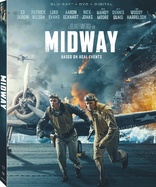Midway Blu-ray Movie
HomeMidway Blu-ray Movie 
Blu-ray + DVD + Digital CopyLionsgate Films | 2019 | 138 min | Rated PG-13 | Feb 18, 2020
Movie rating
6.8 | / 10 |
Blu-ray rating
| Users | 0.0 | |
| Reviewer | 3.5 | |
| Overall | 3.5 |
Overview
Midway (2019)
The story of the battle of Midway, told by the leaders and the soldiers who fought it.
Starring: Ed Skrein, Patrick Wilson, Woody Harrelson, Luke Evans, Mandy MooreDirector: Roland Emmerich
| Action | Uncertain |
| War | Uncertain |
| History | Uncertain |
| Drama | Uncertain |
Specifications
Video
Video codec: MPEG-4 AVC
Video resolution: 1080p
Aspect ratio: 2.39:1
Original aspect ratio: 2.39:1
Audio
English: Dolby Atmos
English: Dolby TrueHD 7.1 (48kHz, 24-bit)
English: Dolby Digital 2.0
Spanish: Dolby Digital 5.1
DD 2.0 = Late night audio track.
Subtitles
English SDH, Spanish
Discs
Blu-ray Disc
Two-disc set (1 BD, 1 DVD)
Digital copy
DVD copy
Packaging
Slipcover in original pressing
Playback
Region A (locked)
Review
Rating summary
| Movie | 3.5 | |
| Video | 4.5 | |
| Audio | 5.0 | |
| Extras | 2.5 | |
| Overall | 3.5 |
Midway Blu-ray Movie Review
Reviewed by Jeffrey Kauffman February 20, 2020There's an old adage that states that if at first you don't succeed, try, try again. In 1976, Universal sought to capitalize on its latest marketing gimmick, Sensurround, one which had made Earthquake something of a sensation in 1974 courtesy of bombastic low frequency effects that literally shook the floorboards, by adding it to the sound design of Midway. Despite that “new, improved” aspect to the audio element, a lot of the rest of the 1976 version of Midway seemed positively old fashioned, including a rather odd preponderance of stock footage and even snippets from other war films (evidently utilized to help keep budgeting concerns at bay), as well as some patently wooden dialogue that hardly made it seem like the fate of the free world might be at stake. Despite being kind of dowdy and surprisingly unexciting quite a bit of the time, and due at least in part to both a pretty starry cast (albeit one that featured a number of stars who were probably more prominent in the 1950s and 1960s than the mid-seventies) and Sensurround, 1976’s Midway was a rather sizable hit. (Sensurround nonetheless went the way of another low frequency emitting giant, the dinosaur, pretty soon thereafter.) Over forty years later, the Battle of Midway was rejoined courtesy of what I like to call “gonzo epic auteur" Roland Emmerich, who had reportedly long fantasized about making a film version of what many historians consider to be a major turning point in the Allies’ fortunes during World War II. In fact, Emmerich himself states in one of the supplements adorning this release that he had pitched the idea of another Midway to Sony back when he was working with the studio on Godzilla, but that his (not to "WWII pun" too terribly) "overlords" in Japan didn't feel inclined to spend gazillions of dollars on a movie about a battle they had lost so disastrously.
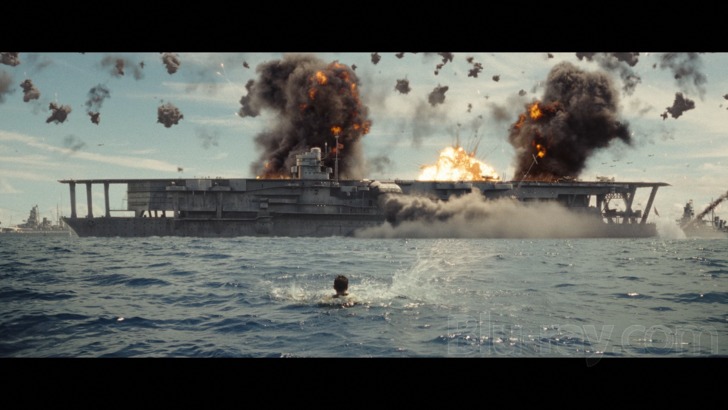
Kind of hilariously, given my joke about Roland Emmerich being a “gonzo epic auteur”, his version of Midway actually spends a good deal of its first act aping another proponent of the same cinematic philosophy, a certain Michael Bay, by restaging the attack on Pearl Harbor. Adding into a no doubt unintentional “meta” irony, Midway kind of humorously also apes the approach of that “other” film about Pearl Harbor, Tora! Tora! Tora!, by offering ping ponging vignettes involving Americans and Japanese, with the Japanese segments featuring Japanese actors and playing out in Japanese with English subtitles. All of this said, it's notable, therefore, that Midway spends as much if not more time in documenting what led up to the ferocious battle in the Pacific, rather than the battle itself.
It’s also notable, and actually commendable, that Wes Tooke’s screenplay shies away from focusing on fictional (or fictionalized) characters, as the 1976 Midway did (marquee star Charlton Heston played a fictional captain named Garth in that version, to cite just one example). That gives this film the perceived imprimatur of authenticity, but it actually takes until the closing credits, when “what happened to” various characters text cards are presented, with pictures of the actual men involved, that the full emotional impact of this decision may be felt by some viewers. The first of these real life characters is Lt. Commander Edwin T. Layton (Patrick Wilson), who is first shown in Japan in the mid to late thirties before hostilities had broken out, but who is later stationed in Pearl Harbor when that attack takes place. The film also relatively quickly introduces hotshot Lt. Dick Best (Ed Skrein), a guy who decades later would have given Tom Cruise a run (flight?) for his money in Top Gun. One of the more surprising casting decisions (to me, anyway) was the choice of Woody Harrelson, here featured with silver hair, as Admiral Chester W. Nimitz, who assumes command of what is initially seen as a very probably insurmountable lead in naval power Japan has assumed after wiping out much of the Pacific Fleet.
If the emotional element here is arguably as hokey at times as it is in the 1976 film, the fact that some of these stories are ostensibly true ones does give this version a probably more visceral subtext. That’s probably truest in the story of Dick Best, not so coincidentally because it includes at least some scenes with his family. Either by design or perhaps unintentionally, there’s actually very little emotional connection with the Japanese characters, who are on hand mostly to spout strategies. That said, while there’s an obvious attempt to get at some real feeling human emotion, albeit intermittently and to variant effect, there’s also no denying that Emmerich doesn’t shy away from offering depictions in the battle scenes especially that are visually hyperbolic and generate almost instinctive adrenaline rushes, but which may not ultimately come off as “realistic”.
My colleague Martin Liebman gave the 1976 Midway an overall score of 3.5 in his Midway Blu-ray review. I frankly would have been considerably less charitable, as I personally found it to be a pretty ham handed affair and just one example of the kind of shocking falloff in quality in a mere six years from the decade's first notable World War II film other than Tora! Tora! Tora!, Patton. With that in mind, there's no question that this Midway is a considerably more satisfying film at least purely from a technical standpoint, but I'd also say from a general writing perspective as well, though the film doesn't manage to shy away from any number of war film clichés. The spectacle almost always works throughout this film, but the Japanese often come off as types rather than humans, and some of the American stories tend to wallow in a kind of sentimentality that admittedly delivers some emotion, but which can seem manipulative and overwrought.
Midway Blu-ray Movie, Video Quality 

Midway is presented on Blu-ray courtesy of Lionsgate Films with an AVC encoded 1080p transfer in 2.39:1. The IMDb lists the Panavision
Millennium DXL2 as having captured the imagery (at a source resolution of 8K!), but the film's closing credits list the Red camera, so perhaps both
were
utilized*. The IMDb lists things were then finished at a 2K DI. I'm of two minds about the look
of this presentation, frankly, and I'm also really curious to see what it looks like in 4K (I'll be reviewing that version within a day or so). On
the plus side, detail levels on "real" things like, you know, actual human beings and practical props are almost always excellent, with fine detail really
popping on fabrics and facial features. The CGI here is often pretty soft looking, and rather large swaths of this film have what I'd term a
"300 ambience", where what certainly seem to be greenscreened backgrounds just
look
slightly artificial and even hazy at times. There are some interesting lighting and grading choices at play. The brief opening vignette outside in
Japan
in 1937 is just slightly desaturated, but with reds still predominating in the color that remains, and later moments have been tweaked toward yellows
and browns. Several of the big battle scenes feature pretty prevalent grays and cool slate colors skewing toward blues. What appears to be digital
grain has been added here, and to my eyes,
it's not always helpful. In the opening moments in Japan, for example, and perhaps due at least in part to the brightness and desaturation already
mentioned, the imagery almost looks pockmarked with black specs. This tendency recurs in later more brightly lit moments, but struck me more
than
once as doing little more than making things look slightly dirty. I'm scoring this at a 4.5
because the bulk of the imagery here, at least in terms of the non-CGI elements, is typically very well rendered. Your tolerance for lots of CGI in
both
special effects and seemingly in quite a few of the backgrounds as well as the look of the digital grain may determine how you personally feel this
rates.
* Update: This discrepancy kind of intrigued me and I did a bit of reading today. It seems that this Panavision model utilizes a Red sensor,
which may account for the different data points.
Midway Blu-ray Movie, Audio Quality 
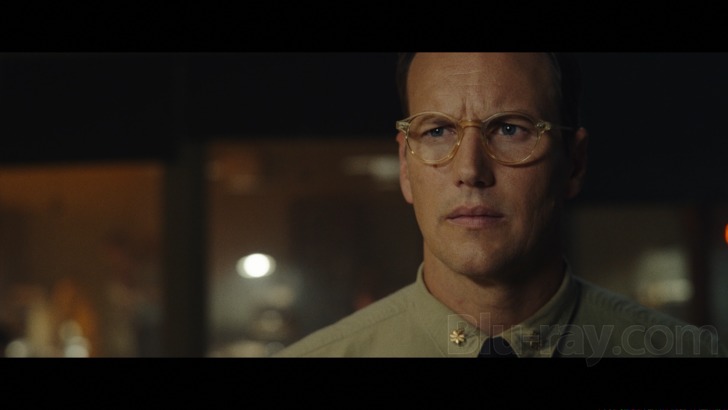
This has been an awesome last few weeks for those of us with Dolby Atmos setups in our home theaters, and that's once again the case with the release of Midway. Much as with the recently reviewed Ford v Ferrari 4K, Midway offered this particular audiophile a virtually nonstop listening extravaganza that regularly exploits overhead effects courtesy of the many sequences involving flying, machine gun bursts into the open air, and, of course, bombs dropping precipitously toward their target. Kind of ironically given the less than laudatory reviews the 1976 Midway's Blu-ray release received by some who actually remembered the original Sensurround experience, this Midway absolutely glories in LFE, with huge, rumbling effects emanating from the subwoofer that actually did rattle my floorboards on more than one occasion. The film also benefits from a really expressive, elegiac score by Thomas Wander and Harald Kloser which sounds fantastic as well. Dialogue is always rendered cleanly and clearly, prioritization is smart even in the very noisy battle scenes, and dynamic range is incredibly wide.
Midway Blu-ray Movie, Special Features and Extras 
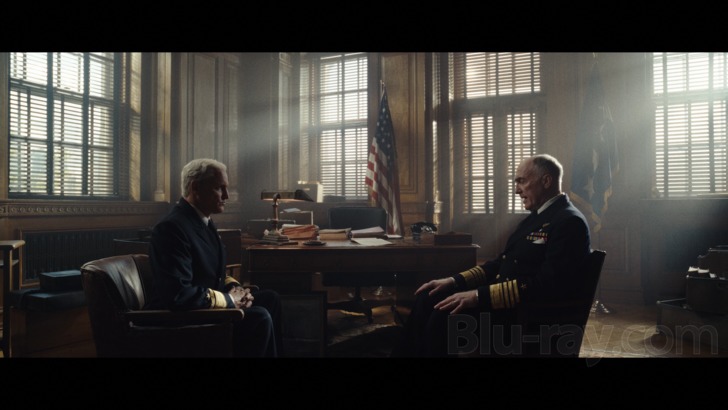
- Audio Commentary by Roland Emmerich
- Getting it Right: The Making of Midway (1080p; 14:16) is an okay EPK which speaks to the filmmakers' attempts to keep things factual.
- The Men of Midway (1080p; 12:24) focuses on some of the real life characters in the film.
- Roland Emmerich: Man on a Mission (1080p; 4:57) is an interesting EPK which gets into Emmerich's long interest in the subject.
- Turning Point: The Legacy of Midway (1080p; 15:00) gives some historical analysis of what the Battle of Midway meant.
- Joe Rochefort: Breaking the Japanese Code (1080p; 6:14) is another more historically themed bonus feature which gets into the "Japanese" version of Enigma.
- We Met at Midway: Two Survivors Remember (1080p; 9:29) is an incredibly moving piece with two veterans.
- Theatrical Trailer (1080p; 2:33)
Midway Blu-ray Movie, Overall Score and Recommendation 
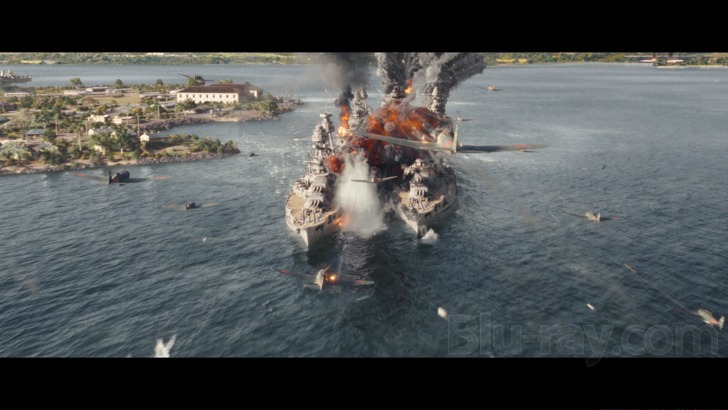
I don't know, maybe people should just stop trying to make movies about the Battle of Midway. As the son of one of the "greatest generation" (albeit an Army guy), I've always had a fondness for World War II movies, though I frankly never warmed much to the 1976 Midway. In that regard, while this version wasn't a complete home run for me, there's absolutely no question in my mind that this version manages to stick to mostly real life characters and deliver its story in a relatively concise, understandable way, pausing every once in a while for a requisite explosive action sequence. Emmerich obviously knows how to stage the big set pieces, and there are several breathtaking shots in Midway. Some of the writing comes off as nearly as wooden as the 1976 offering, but that said, this film arguably delivers more on the emotional front than the 1976 version did. It strikes me as interesting and perhaps meaningful that I received not one word of press coverage from Lionsgate's usual PR firms with regard to this release, suggesting maybe Lionsgate itself doesn't have much interest in it. Technical merits are solid, and with caveats noted, Midway comes Recommended.
Similar titles
Similar titles you might also like

Dunkirk 4K
2017

Hacksaw Ridge 4K
2016

Fury 4K
2014

Pearl Harbor
2001

Flags of Our Fathers
2-Disc Special Edition
2006

13 Hours: The Secret Soldiers of Benghazi 4K
2016

Angel Has Fallen
2019

Red Tails
2012

12 Strong
2018

We Were Soldiers 4K
2002

Pacific Rim: Uprising 4K
2018

The Patriot
Extended Cut
2000

Windtalkers
2002

U-571 4K
25th Anniversary Edition
2000

Stalingrad 3D
Сталинград
2013

Olympus Has Fallen
2013

White House Down
2013

Red Dawn
2012

Saving Private Ryan 4K
Commemorative 20th Anniversary Edition
1998

300: Rise of an Empire
2014
